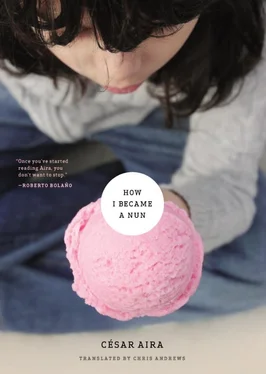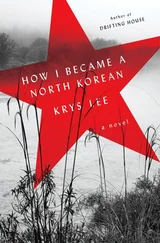He put the spoon into the cone, dipped it into the remains of the pink ice cream, half-melted now but still solid enough to scoop up, and lifted it to his mouth. I shall not slight the memory of my father by suggesting that he couldn’t let an ice cream go to waste when he had paid good money for it. I’m sure that’s not what it was. Sometimes he had miserly reflexes, as we all do, but not in a situation like that. He had always been a straightforward, small-town sort of guy. I’m sure he didn’t even imagine the possibility of complicating the tragedy. I like to think that he did it simply to relish a spoonful, just one spoonful of delicious, genuine strawberry ice cream. Like an ultimate, secret, sublime confirmation.
But then the situation turned around. He screwed up his face in a grimace of disgust and spat emphatically. It was revolting! I was staring at him pop-eyed (I was pop-eyed already from the retching), seeing double or triple. I should have been exulting in the triumph of the weak, a sentiment I knew so well, the triumph of those for whom vindication always comes too late. And perhaps there was an element of that, since the habit was deeply ingrained. But I didn’t feel exultant. In fact I didn’t really understand what was going on. Instead of accepting the obvious explanation, as any person in their right mind would have done, I was so caught up in the disaster that I was looking for something more baroque, another turn of the screw that would not cancel out what had gone before.
He lifted the cone to his nose and gave it a good sniff. His expression of disgust intensified. There was that stalling of imperceptible movements that precedes the swing into action. He wasn’t a man of action; in that respect he was normal. But sometimes action has to be taken. He didn’t look at me. Throughout the rest of that ill-fated afternoon, he didn’t look at me again. Although I must have been quite a sight to behold. Not once did he look in my direction. Looking would have been a kind of explaining, and it was already too late for explanation to bridge the gap between us. He got up and headed for the ice-cream store, leaving me alone on the sidewalk bench, all in a mess and crying. But I followed him.
“Mister …”
The ice cream vendor looked up from his comic book. He tried to compose his features, because he sensed there was a problem, but he couldn’t imagine what it might be.
“This lousy ice cream you sold me is off.”
“No.”
“What do you mean, No, for Christ’s sake!”
“No sir, all the ice cream I sell is fresh.”
“Well, this one is rotten.”
“What flavor is it? Strawberry? It was delivered this morning.”
“What the hell do I care? It’s rotten.”
“Doesn’t come any fresher,” insisted the vendor. He looked along the row of drums with aluminum lids lined up under the counter and opened one. “Here it is. Brand new; I opened it for you.”
“Don’t try it out on me.”
“Is it my fault if the boy didn’t like it?”
Dad had gone red with fury. He held out the cone.
“Try it!”
“I don’t have to try anything.”
“No … you’re going to try it and you’re going to tell me if …”
“Don’t shout at me.”
In spite of this reasonable suggestion, both of them were shouting.
“I’m going to report you.”
“Don’t make me laugh.”
“Who do you think you are?”
“Who do you think you are?”
By this stage it had become a battle of wills. It was too late for the problem to be solved in a rational fashion. My father must have known that if he had tried the strawberry ice cream at the start, things wouldn’t have degenerated to this point. But he hadn’t, and now he was being paid back in kind, although it seemed like pure malevolence to him. I sensed that he was prepared to force the vendor to taste it. The vendor, on the other hand, was in what he thought was a win-win situation: he could try the ice cream and even if it turned out to have an odd, slightly bitter or medicinal taste, he could launch into an endless debate about the incommunicability or undecideability of taste sensations. At that moment two teenagers walked in. The ice cream vendor turned to them with a look of triumph on his face.
“Two one-peso cones.”
The one-peso ice creams were big: four scoops. At the time two pesos was a considerable sum. The scene underwent a radical change. It was transformed by a new light, the light of prosperity and normality; the wide world had entered the shop in the form of those two teenagers. The sinister figure of the madman complaining about some nuance in the flavor of a ten-cent ice cream had been swept aside. This opening up of the situation called for new rules. Rational rules, which had been lacking. Any relationship, even (or especially) mine with Dad, has its rules. But there were also the general rules for the game of life.
The ice cream vendor was quick to realize this, and it was the last thing he realized. Without changing his triumphant expression, he said, “Let’s see about this strawberry then.”
He was talking more to the newcomers than to Dad. It was the clincher, his final show of mastery. My father was still holding the sad little cone of melted ice cream. The vendor wasn’t going to taste that mess; he would sample his good ice cream, untouched and fresh from the drum.
Dad got worried. He felt defeated. “No, try this …” he said. But he said it without much conviction. It didn’t make sense. And yet, in a way, it did. All things considered, he was right to keep that card up his sleeve. If the ice cream from the drum turned out to be all right, he could still fall back on the cone.
The vendor lifted the lid, took a clean spoon, scraped the surface with it and lifted it to his mouth like a connoisseur. The reaction was instantaneous and automatic. He spat to one side. “You’re right. It’s horrible. I hadn’t tried it.”
He said it just like that. Like the most natural thing in the world. It didn’t occur to him to say sorry. It really was out of order. It was too much for Dad. Hatred, the destructive instinct, overwhelmed him in an instant with the force of a physical blow.
“Is that all you’ve got to say to me? After …”
“Hey, calm down! How was I supposed to know?”
At this point, the only option left open, the only way forward, for both of them, was sheer, untrammeled violence. Neither was about to back down. Dad leant over the counter to thump the ice cream vendor, who braced himself behind the cash register. The two teenagers ran out, past me (I was standing on the threshold, transfixed, engaged in a warped attempt to connect up the different logics that had supplanted one another in the course of the dispute) and watched from outside. Dad had jumped over the counter and was aiming all his punches at his opponent’s head. The vendor was fat, clumsy, and unable to hit back; all he could do was shield himself, more or less. Dad was shouting like a lunatic. He was beside himself. A punch that happened to land square on the vendor’s ear spun him through ninety degrees. He ended up facing away from Dad, who grabbed him by the nape of the neck with both hands, pushed up against him from behind (as if he were raping him), and put his head into the drum of strawberry ice cream, which was still open.
“Go on, eat it! Eat it!”
“Nooo! Get him … uggh … off me!”
“Go on …!”
“Uggh!!”
“Eat it!”
With herculean force he shoved the vendor’s face into the ice cream and kept pressing down. The victim’s movements became spasmodic, less and less frequent … and eventually stopped altogether.
I NEVER KNEW HOW I got out of the ice-cream store … or was taken away … or what happened … I lost consciousness, my body began to dissolve … literally … My organs deliquesced … turning to green and blue bags of slime hanging from stony necroses … with no life but the cold fire of infection … and decomposition … swellings … bundles of ganglia … A heart the size of a lentil, numb with cold, beating in the midst of the ruins … a faltering whistle in my twisted trachea … nothing more …
Читать дальше












